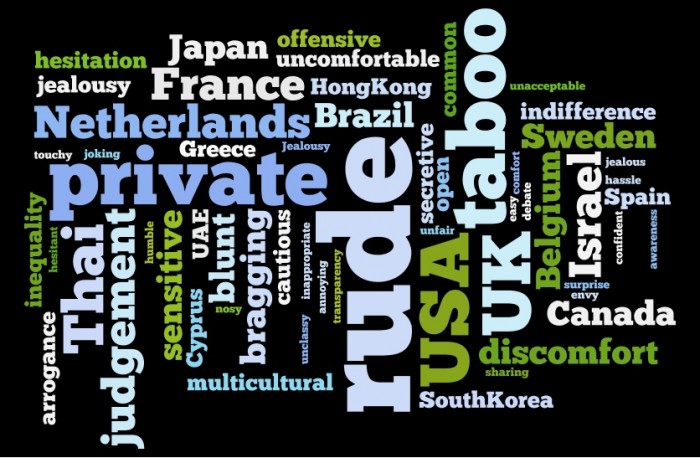
We asked people from different countries what they earned. You'll never guess what happened.
In France it’s not-done, in Brazil it’s private and in Thailand it’s plain taboo: where in the world is it OK to ask people what they earn?
Generation Y’s attitude toward personal finances has taken a major conservative shift as a result of the Great Recession. Millennials are less trusting of the stock market and want more control over their own financial management. But how do we feel about talking about it? Having had to step into the professional world amid economic turmoil, could we benefit from being more transparent about our money? Do young professionals around the world today respond when they’re asked how much they earn?
We decided to try and find out. Tapping our social networks, we reached out to 50 people representing 18 different nationalities. Most were from a sample of educated, multicultural, 20-somethings.
We aimed for diversity, reaching out to clusters of different cultural backgrounds and professions including a Swedish venture capitalist, a French photographer and barista living in London, an Amsterdam-based Thai-Dutch software engineer, a South Korean working in the Canadian film industry, an Indian-Thai in retail consulting, a Scottish-British global fashion brand manager, a New York actress and a Brazilian architect.
Your Culture, My Culture, Our Culture
From the Belgians to the Japanese, everyone could concur it's generally considered rude to ask how much money someone makes. The Brits claimed approaching the subject with a polite “if you don’t mind me asking” could make it acceptable. The North Americans (mainly New Yorkers and a few Canadians) were more reserved, saying it depended on the nature of the relationship and motives of whoever was asking.
The Dutch, Belgians and French confirmed it went against etiquette and was generally 'not-done'. The Brazilians said money is regarded as a strictly private affair, but that they’d noticed some recent changes. While admitting it's considered rather rude, the Israelis said the subject often comes up in conversation in their culture. The Thais all agreed it was taboo to bring it up, perhaps more than the other Asian cultures we questioned. They were also most reluctant to talk about salaries in the workplace, some having signed confidentiality agreements against it. “We aren't allowed to discuss our salary, probably because it's so low," one girl working in event marketing stated. Every cultural background pointed toward the disdain of a bragger.

Envy, jealousy, taboo? These are the words that came up in our survey of different nationalities
But what about on a personal level? Would they be comfortable sharing their salary amount with someone they’d just met? Yes and no. What about co-workers? Again, a mix. What about with friends, family, roommates? Almost everyone would. While everyone could tell us how the custom was regarded in their culture, on an individual level it seemed no significant cultural generalisations could be made. And, interestingly enough, no one across our entire multicultural survey could tell us they’d ever really felt offended or offended anyone by asking about salaries.
We did identify a few cases of cross-cultural imparity, though. “People here talk about salary and money all the time,” said a Japanese banker working in Singapore. “They ask about my rent, bonus and salary. At first it made me feel very uncomfortable.” A Vancouver-based market researcher from a Thai-Taiwanese background said it depended on her whereabouts: “My parents often tell me the exact amount a family friend’s son or daughter is earning. When I’m in Canada, I usually hear it mentioned as a ballpark figure. I’d be more open to discussing salaries in Asia than North America.”
Upbringing proved to be a common factor in determining people’s openness toward the subject of money. “When I told my parents I was getting serious with my boyfriend, they responded by asking how much he made,” said one Indian student living in London. “He’s European and wouldn’t tell me.”
Friend or Foe?
Understanding cultural norms still plays an important role in understanding how we handle money around the world. But the paramount seems to be the nature of the relationship between people. Who is this person asking and what are their motives? Are my coworkers friends or foes? Why is it any of their business?
We may not feel offended by the question, though talking money does still seem to make us uncomfortable. But why? From South America to South East Asia, it seems money talk is considered breeding ground for envy and awkward feelings we’d rather avoid-- even if we’re not that fussed about sharing on an individual level.

The Future is Transparent
What would happen if we all decided to be more transparent about how much money we make? For example, if we decided to share our salaries more openly with each other, it might make negotiating for raises easier. And perhaps it would provide more clarity around equal pay for men, women and minorities. A more open pay culture in our workplaces could leave us with a greater job satisfaction.
Last year, Buffer, a San Francisco based startup, announced a new company policy called "Open Salaries", a simple formula to calculate salaries that is shared with the whole team. "Transparency breeds trust," writes Joel Gascoigne, the founder and CEO of Buffer, "And that’s one of the key reasons for us to place such a high importance on it. Open Salaries are a step towards the ultimate goal of Buffer being a completely 'Open Company'."
From a management perspective, little research has been done into such policies of pay transparency. What we do know is that keeping it secret doesn’t stop employees from guessing how their bosses’ and colleagues’ salaries compare to theirs. This often results in false speculations that lead to demotivation and harm work performance. In a time where we’re openly sharing everything, from what we had for breakfast to details of our intimate relationships, why aren’t we more open about our salaries? Is it time we begin to shift this collective attitude? Why’s it all still such a big secret?
By Lisa Roolant, a writer for Wise. Roolant is of Belgian origin, born and raised in Bangkok. She is also London's lead strategist at audience.io and the creator of Gypsy Generation, a platform for globally inspired stories about creativity. Images courtesy of Shutterstock
*Please see terms of use and product availability for your region or visit Wise fees and pricing for the most up to date pricing and fee information.
This publication is provided for general information purposes and does not constitute legal, tax or other professional advice from Wise Payments Limited or its subsidiaries and its affiliates, and it is not intended as a substitute for obtaining advice from a financial advisor or any other professional.
We make no representations, warranties or guarantees, whether expressed or implied, that the content in the publication is accurate, complete or up to date.